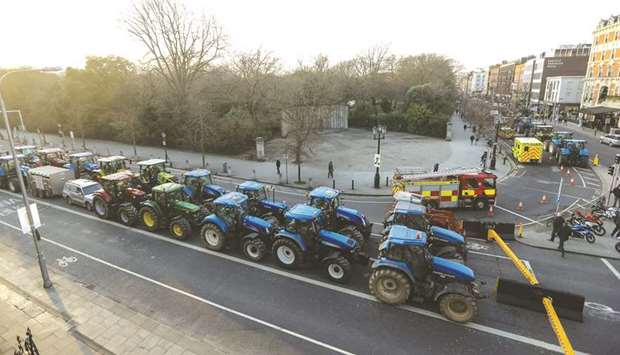Irish farmers have paralysed parts of central Dublin for the second time in as many months by parking more than 100 tractors in the streets on Wednesday in a protest against the government on the first day of its re-election campaign.
Prime Minister Leo Varadkar launched his party’s campaign for the February 8 vote — which he had called on Tuesday — near the border with Northern Ireland to focus on his key role in Britain’s divorce deal with the European Union.
But in Dublin, farmers arrived on tractors from all over Ireland to protest over low beef prices and government climate-change initiatives they say unfairly target their livelihoods.
Varadkar acknowledges that more had to be done for people to feel the benefit of the booming economy in their own finances, and his re-election could hinge on the attitudes of those whom opposition parties say feel left behind.
“(Varadkar’s Fine Gael party) will suffer in rural Ireland,” said protester Ollie Gargan, 43, who runs a farm with 30 suckler cattle in the northern county of Cavan.
He voted for Fine Gael in the 2016 election but ruled out doing so again.
“They are just throwing crumbs from the top table. There’s no future for young farmers,” Gargan said.
Some farmers who left their tractors to protest at the gates of government buildings could be heard shouting at Varadkar as he greeted EU Commission President Ursula Von der Leyen outside his office ahead of a meeting between the pair.
Farmers staged a similar protest in cordoned-off areas of Dublin in November when, rather than leave at the allotted time, many slept in their vehicles overnight and refused to leave until Agriculture Minister Michael Creed met them.
Creed said late on Wednesday the government could not intervene on beef prices but had secured an extra 120mn euros ($133.88mn) of income support for farmers this year in what he acknowledged was a difficult year for the industry.
At the wheel in tractors covered in placards with slogans such as “Stop Farmer Exploitation” and “Help Save Rural Ireland”, angry farmers said that was not enough.
“There’s been no effort. Zilch,” said John Denash, a 50-year-old beef farmer from the western county of Roscommon.
The woes farmers face, including potential losses from increased barriers to trade with post-Brexit Britain, may become a battleground in rural districts just as high rents and housing shortage is set to dominate the campaign in urban areas.
Fine Gael and the main opposition Fianna Fail are closely matched in opinion polls, some distance ahead of their other rivals, increasingly the likelihood that one of the two centre-right parties will head the next government.

Farmers protest on St Stephens Green, near Government Buildings in Dublin on Wednesday.
